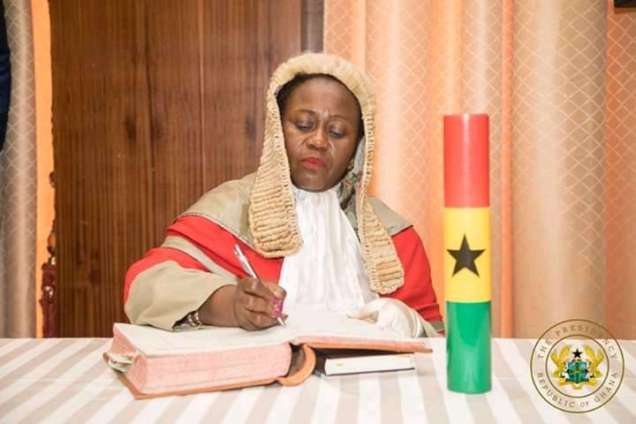CJ’s Lurking Removal Hangs Between Merit and Stability
Meanwhile, the historical rarity of a Chief Justice being removed from office in Ghana is another dimension that needs to be considered.
- Advertisement -
The debate over whether or not Chief Justice Gertrude Torkornoo should be removed from office has ignited widespread discussions across Ghana’s legal, financial, and political circles.
With petitions filed against the Chief Justice and President John Mahama forwarding them to the Council of State for consultation, opinions remain divided on the implications for the judiciary and governance in Ghana.
- Advertisement -
Accordingly, Dr. Kwame Asiedu Sarpong, a Democracy and Development Fellow at the Ghana Centre for Democratic Development (CDD-Ghana), raised concerns about the ongoing tenure stability.
- Advertisement -
He questioned whether the focus should be on whether the Chief Justice should be removed or whether the petitions against her hold merit.
He underscored the significance of upholding due process and maintaining the integrity of state institutions, stressing that any calls for the removal of a high-ranking public official should be taken seriously.
“The CJ might be doing some good, but if the petitions have merit that make her position untenable, should the President ignore the advice from the Council of State?”
Dr. Sarpong acknowledged his internal conflict over the matter, explaining that while he dislikes the idea of individuals in constitutionally tenured roles being removed by the executive, he also opposes unchecked power.
“In all this, the checks and balances must work,” he stressed, adding that he hopes the petitions will be made public for transparency.
Amid the controversy, John Awuah, Chief Executive Officer of the Ghana Association of Banks, also made a strong case against the removal of the Chief Justice.
He urged the President to reconsider, warning that such an action could have far-reaching implications for governance and the legal system.
“As popular as the call from the base may be, this Chief Justice is doing a lot to improve financial intermediation in Ghana—that is something this country needs.
He expressed support for President Mahama’s broader governance agenda but cautioned that dismissing the Chief Justice would not add positively to his political capital.
Awuah also called on the public to rally behind the country’s institutional structures, stating, “Your Excellency, we want you and Ghana to succeed.”
His remarks highlight the delicate balance between political leadership and maintaining independent institutions.
Meanwhile, the historical rarity of a Chief Justice being removed from office in Ghana is another dimension that needs to be considered.
- Advertisement -
The last instance occurred in December 1963, when Chief Justice Arku Korsah was dismissed on national security grounds under Ghana’s First Republic.
Accordingly, Oliver Barker-Vormawor, a lawyer and political activist, pointed out that attempts to remove Supreme Court justices—especially the Chief Justice—have historically been met with staunch resistance from the judiciary itself.
“A lot of times, they [the judiciary]have even added their own words to the Constitution to protect themselves.
“Still, may any removal be a cautionary tale. And may any failure to remove serve as a reminder that we serve at the public’s pleasure and at the control of justice.”
He, however, noted that after Korsah’s removal, multiple heads of state and speakers of Parliament were removed, with the risk of similar occurrences remaining ever-present.
His comments underscore the judiciary’s long-standing effort to shield itself from external interference.
Barker-Vormawor warned that absolute power, when unchecked, can lead to corruption and inflated egos.
He suggested that the judiciary must remain accountable to the public and that any attempts to remove a Chief Justice should serve as a cautionary tale.
The unfolding debate surrounding the Chief Justice’s possible removal underscores a fundamental question about Ghana’s democracy—how to balance the independence of the judiciary with the need for accountability.
The judiciary, as the final arbiter of the law, must remain impartial and free from undue influence. However, as Dr. Sarpong pointed out, no public office should be beyond scrutiny.
The rule of law thrives when institutions are strong, transparent, and resistant to political manipulation.
If the petitions against the Chief Justice have merit, due process must take its course. Conversely, if they are politically motivated, then their failure to result in removal should reinforce the judiciary’s independence.
Ultimately, whether the Chief Justice stays or goes, this debate serves as a test of Ghana’s democratic resilience.
The coming weeks will reveal whether this is an exercise in accountability or a politically charged attempt to reshape the judiciary’s leadership.
- Advertisement -


